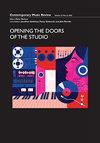体验表演中的不确定性
IF 0.1
2区 艺术学
0 MUSIC
引用次数: 0
摘要
我们所说的“执行不确定性”是什么意思?在某种程度上,表演总是一种具有实质确定性的行为:我们在某种程度上将声音或动作的产生归因于某种目的。一个事件就这样产生并被见证。但表演也总是不确定的:偶然性、情境性和不同程度的不可预测性,其特点是表演者、乐器(任何类型)、空间和观众的复杂互动具有重大的不确定性。被定义为不确定的表演音乐可以,但并不总是,在表演事件中涉及不确定性。一些演奏者在决定表演内容之前,会利用排练过程来探索不同的可能性。在这里,无论内容如何完全确定,表演中的不确定性程度可以说与表演任何分数所固有的不确定性没有什么不同。不同之处在于实现绩效的过程。相比之下,当然还有许多不确定音乐的表演,玩家或多或少会在当下就确切的内容做出决定,尽管可能性有限。同样,也有分数本身决定了绩效的不确定性,以及绩效决策中需要的指示。这篇综述证实了该领域的丰富性和复杂性,但尽管50年来,不确定性一直是争论和理论化的主题,但话语仍然主要集中在作曲家身上:他们意图的程度和性质,以及他们在乐谱中的表达方式。在这方面,即使是表面上以表现为导向的讨论,也很少超越意识问题:球员对特定得分能做什么,不能做什么。尽管有人声称不确定的音乐可以为玩家提供特定的创作代理,尽管某些表演者有着深刻的评论,也不管那些人的作品,比如乔治·E·刘易斯和本杰明·皮库特,他们认为不确定性和实验性与更广泛的音乐实践网络有关,这篇文章的大部分内容仍然用旧的措辞表达。本文从音乐出发,结合马乔丽·佩洛夫在20世纪80年代初对文学不确定性本质的思考,探讨了不确定性与一系列表演作品中表现出的反射性的相似之处。主要关注的是不确定性的根源,关注其在表演体验中的表现;它在表演上的内在性。这背后的论点是,我们对这一点关注不够——我们可能会更仔细地考虑什么构成了在表演中经历的不确定性;我们所做的是在表演中和通过表演来表现不确定性,将其带入表演行为,体现它。本文章由计算机程序翻译,如有差异,请以英文原文为准。
Experiencing Indeterminacy in Performance
What do we mean by ‘performing indeterminacy’? Performance is, on one level, always an act of substantial determinacy: we ascribe the making of a sound or action to purpose of some kind, on some level. An event is brought into existence and witnessed as such. But performance is always, also, indeterminate: contingent, contextual and unpredictable to different degrees, characterised by the significant uncertainties in the complex interactions of performers, instruments (of any kind), spaces and audiences. Performing music defined as indeterminate can, but does not always, involve indeterminacy in the event of performance. Some players, with some pieces, use the rehearsal process to explore different possibilities before determining the content to be delivered in performance. Here, the extent of that indeterminacy in performance is arguably no different to that inherent in performing any score, no matter how fully determined the content. The difference lies in the process towards performance. In contrast, there are of course many performances of indeterminate music in which players make more or less in-the-moment decisions about exact content, though from a circumscribed range of possibilities. And, equally, there are scores that themselves determine such indeterminacy in performance, with instructions that require in-performance decision making. This summary confirms the richness and complexity of the field, but while indeterminacy has been the subject of ongoing debate and theorisation for some 50 years now, the discourse remains predominantly focused upon composers: on the extent and nature of their intentions and how they are expressed in scores. In this respect, even apparently performance-orientated discussion rarely moves beyond matters of realisation: what a player can and cannot do in response to a particular score. Despite all the claims for the ways in which indeterminate music might afford players a particular creative agency, notwithstanding the insightful commentaries of certain performers, and regardless of the work of those, like George E. Lewis and Benjamin Piekut, who have considered indeterminacy and experimentalism in relation to a wider network of musical practices, much of the discourse remains couched in the same old terms. Starting away from music, with Marjorie Perloff’s consideration of the nature of literary indeterminacy in the early 1980s, this essay explores the parallels with the reflexive quality of indeterminacy manifested in a range of performance work. The main concern is the locus of indeterminacy, focusing on its manifestation in the experience of performing; its immanence in performance. Underlying this is the contention that we don’t attend to this enough—that we might consider more carefully what constitutes indeterminacy experienced in and through performance; what we do in manifesting indeterminacy in and through performance, bringing it into the act of performance, embodying it.
求助全文
通过发布文献求助,成功后即可免费获取论文全文。
去求助
来源期刊

Contemporary Music Review
MUSIC-
CiteScore
1.00
自引率
25.00%
发文量
48
期刊介绍:
Contemporary Music Review provides a forum for musicians and musicologists to discuss recent musical currents in both breadth and depth. The main concern of the journal is the critical study of music today in all its aspects—its techniques of performance and composition, texts and contexts, aesthetics, technologies, and relationships with other disciplines and currents of thought. The journal may also serve as a vehicle to communicate documentary materials, interviews, and other items of interest to contemporary music scholars. All articles are subjected to rigorous peer review before publication. Proposals for themed issues are welcomed.
 求助内容:
求助内容: 应助结果提醒方式:
应助结果提醒方式:


